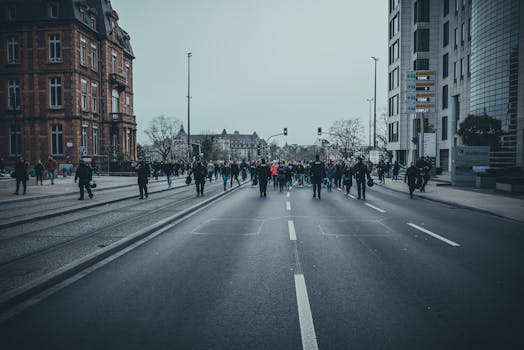News
Why Are Wrestlers Protesting?

-
Table of Contents
- Why Are Wrestlers Protesting?
- The Power of the Platform
- Personal Experiences and Empathy
- Promoting Mental Health Awareness
- Impact and Influence
- Q&A
- 1. Are wrestlers allowed to protest?
- 2. Do wrestlers face any backlash for protesting?
- 3. Can wrestler protests lead to real change?
- 4. Are there any historical examples of wrestler protests?
- 5. How can fans support wrestlers’ protests?
- Summary

Wrestling has long been a popular sport, captivating audiences with its combination of athleticism, showmanship, and storytelling. However, in recent years, there has been a growing trend of wrestlers using their platform to protest various social and political issues. This article aims to explore the reasons behind this phenomenon, examining the motivations and impact of wrestler protests.
The Power of the Platform
Wrestlers, particularly those in high-profile promotions such as WWE and AEW, have a significant platform that reaches millions of viewers worldwide. This platform gives them a unique opportunity to raise awareness about important issues and advocate for change. Wrestlers recognize the influence they have and are increasingly using it to address social injustices and promote causes they believe in.
One example of this is the Black Lives Matter movement. Following the murder of George Floyd in 2020, many wrestlers took to social media to express their support and solidarity. Some even incorporated BLM symbolism into their in-ring attire or promos. By doing so, they brought attention to the issue and sparked conversations among their fans.
Personal Experiences and Empathy
Another reason why wrestlers are protesting is their personal experiences and empathy towards certain causes. Many wrestlers come from diverse backgrounds and have faced discrimination or adversity themselves. This firsthand experience fuels their passion for social justice and motivates them to speak out.
For instance, LGBTQ+ wrestlers have been at the forefront of advocating for LGBTQ+ rights. They use their platform to share their stories, raise awareness about the challenges faced by the community, and promote inclusivity. By doing so, they not only empower others but also contribute to a more accepting and tolerant society.
Promoting Mental Health Awareness
Wrestlers are also increasingly using their platform to shed light on mental health issues. The demanding nature of the profession, both physically and mentally, can take a toll on wrestlers’ well-being. By openly discussing their struggles with mental health, they aim to break the stigma surrounding it and encourage others to seek help.
One notable example is the wrestler Jon Moxley, formerly known as Dean Ambrose in WWE. In interviews and podcasts, Moxley has spoken candidly about his battle with depression and anxiety. His openness has resonated with fans and has helped create a supportive community within the wrestling industry.
Impact and Influence
Wrestlers’ protests and advocacy efforts have a significant impact on both their fans and the wider community. By using their platform to raise awareness, they can mobilize their fan base and inspire action. This was evident during the Black Lives Matter protests, where wrestlers’ support helped amplify the movement and encouraged others to get involved.
Moreover, wrestlers’ protests can also lead to tangible changes within the industry itself. For example, the #SpeakingOut movement, which exposed instances of abuse and misconduct in wrestling, prompted promotions to implement stricter policies and procedures to protect their talent. This demonstrates the power of collective action and the ability of wrestlers to bring about positive change.
Q&A
1. Are wrestlers allowed to protest?
Yes, wrestlers have the right to express their opinions and protest peacefully, just like any other individual. However, the extent to which they can do so may vary depending on their contractual obligations and the policies of their promotion.
2. Do wrestlers face any backlash for protesting?
While some wrestlers may face backlash for their protests, such as criticism from fans or even repercussions from their promotion, many are willing to accept these risks in order to stand up for what they believe in. The support they receive from their fans and the positive impact they can make often outweigh the potential backlash.
3. Can wrestler protests lead to real change?
Absolutely. Wrestlers have a significant influence on their fan base, and their protests can raise awareness, spark conversations, and inspire action. Additionally, when wrestlers come together to advocate for change, as seen with the #SpeakingOut movement, they can bring about tangible changes within the industry itself.
4. Are there any historical examples of wrestler protests?
Yes, there have been several historical examples of wrestler protests. One notable instance is the “Montreal Screwjob” in 1997, where wrestler Bret Hart was double-crossed by the promotion. This incident led to Hart leaving the company and sparked a wave of protests from both wrestlers and fans.
5. How can fans support wrestlers’ protests?
Fans can support wrestlers’ protests by actively engaging with their content, sharing their messages on social media, attending events where they speak about important issues, and financially supporting causes they endorse. It is crucial for fans to show solidarity and amplify the voices of wrestlers advocating for change.
Summary
Wrestlers are protesting for a variety of reasons, including the power of their platform, personal experiences and empathy, and the promotion of mental health awareness. Their protests have a significant impact on their fans and the wider community, leading to increased awareness, mobilization, and even tangible changes within the industry. Wrestlers’ protests should be supported and celebrated as they use their influence for the greater good.

